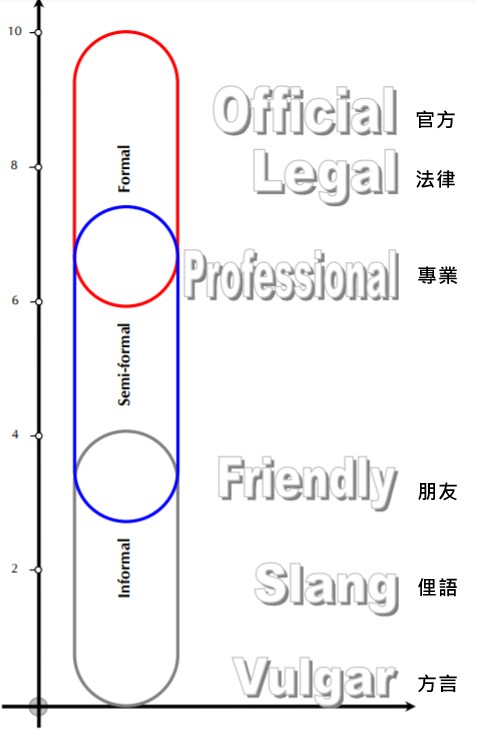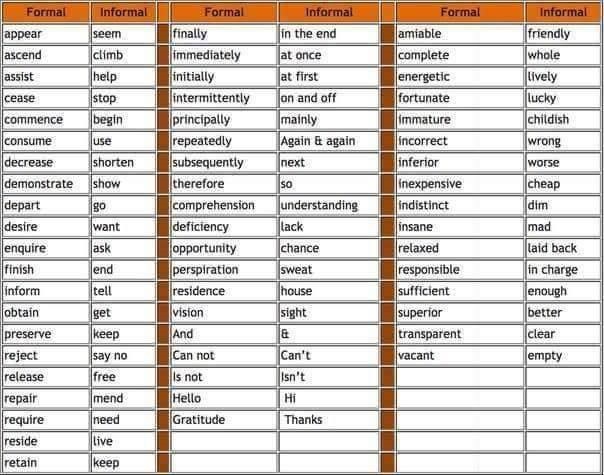英語實驗室
很多人向我們反應自己的語感不好,講常陷入兩難:耽心自己在正式的場合太隨便,不得體,老闆或客戶會覺得他不專業;有時又怕太正式,感覺和同事距離很遠,不該見外的事顯得見外。
其實正式和非正式比語感來得單純,在慢慢培養語感之前,先來看表達的正式與非正式究竟是怎麼一回事:

我們講話既不想要官腔官調(official),也不想要太俚俗(vulgar),其實是介於「朋友」和「專業」之間的「半正式」semi-formal,在這個區間裡,只要抓住幾個相對原則,很快就可以掌握正和非正式原則:
一、「難」就正式,「簡單」就不正式
來看這兩句話
- I have to apologize that….
- Sorry that…..
不難判斷第一句比較正式。判斷正式和非正式的第一個準則就是你選了簡單的字還是難的字。apologize難,比較正式,sorry簡單,就不那麼正式。比較以這些字,不難判斷哪種用法正式:
|
正式 |
非正式 |
中文解釋 |
|
Nevertheless |
anyways |
無論如何/不管怎樣 |
|
Therefore |
So |
因此 |
|
In addition |
Also |
而且 |
|
acceptable |
Okay, OK |
可接受 |
|
however |
but |
然而 |
二、用了「單字」就正式,用「片語」就不正式
別人問你同不同意一件事,你要想一想,可能會這樣回答:
- Give me time to consider.
- I’ll think about it.
比起來第一句就比較正式。片語think about相較於單字consider更口語。正式語言多用單字,非正式用片語。來看更多的例子:
|
正式 |
非正式 |
中文解釋 |
|
substitute |
fill in |
職位代理 |
|
increase/decrease |
go up/go down |
增加/減少 |
|
handle |
deal with |
處理 |
|
omit |
leave out |
刪掉 |
|
cause |
bring out |
造成 |
|
require |
need to |
需要 |
|
discover |
find out |
發現 |
|
establish |
set up |
設立 |
|
represent |
stand for |
代表 |
|
arrive |
show up |
到達 |
三、長句就正式,短句就不正式
正式Could you please let me know if you are available for a meeting on 12th April?
非正式Can you get back to me asap?
四. 用很多縮寫、簡化用字就不正式:
要人儘快回覆,正式語言會不憚其煩用as soon as possible,但非正式會直接用ASAP,熟人之間的溝通會用很多像BTW(by the way),FYI (for your information)、Plz (Please)、THX(thanks)之類的表達。
五. 難拼、難唸、少見的單字就正式,簡單的單字就不正式:

六. Email中正式和不正式,一表搞定
|
|
正式 |
非正式 |
|
稱謂 |
Dear Mr./Ms./Mrs. Johnson Dear Jane |
Hi/Hello Jane Jane |
|
提醒 |
Thank your for your email of… Further to your last email… |
Thanks for your email. Re your email…. |
|
為什麼寫 |
I am writing with regard to… In reply to your email, here are… Your name was given to me by… |
Just a short note about…. I’m writing about…. Please note that…. |
|
主要訊息 |
We are able to confirm that… I’m delighted to tell you that… We regert to inform you that… |
We can confirm that… Good news! Unfortunately…. |
|
附件 |
Please find the attached file. I am sending you …as a PDF file. |
I’ve attached…. Here is the ….you wanted. |
|
要求 |
I’d be grateful if you could…. I wounder if you could…. |
Can you…. Could you…. |
|
承諾 |
I will investigate the matter. I will contact you again shortly. |
I’ll look into it. I’ll get back to you soon. |
|
信末 |
Best regards (謹此致意) Regards/ Kind regards (致意) |
Cheers Speak soon |